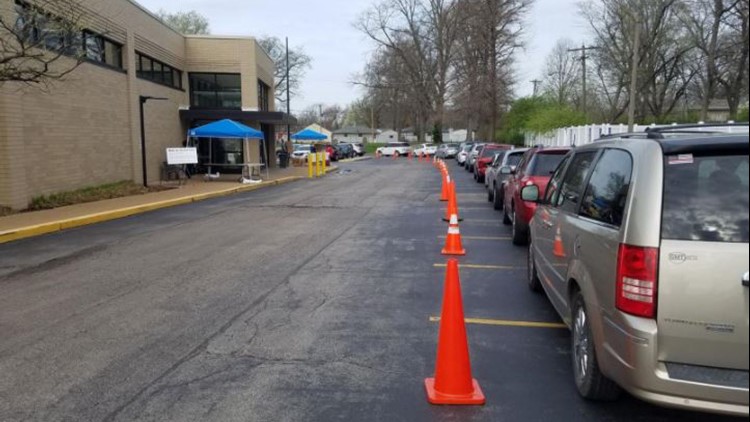ST. LOUIS COUNTY, Mo. — St. Louis County Library fired 122 part-time workers on August 11 — about a third of whom were Black — with the intention of being “good stewards” of taxpayers’ dollars due to decrease in library activity, said Kristen Sorth, president of the county library system. Employees, however, said library workers are busier than ever with some people out sick with COVID-19 and the new duties in food and technology distribution, curbside pickup or online programming.
With the library cutting back to only curbside pickup on July 29, some employees are walking three miles a day carrying books out to cars, said county library workers who spoke with the American on the condition of anonymity. The abrupt layoffs were crushing to both current and now former employees.
“We love our patrons,” one Black librarian said. “We know them by name. We know their kids, we watch them grow up. We love what we do, and that’s why this is heartbreaking for us, because we put our lives into this.”
While Sorth said the number of minority employees fired reflected the library’s overall workforce, some branches lost almost all of their Black employees, workers said. A group of concerned Black current and former employees said that the firings were not based on actual evidence or need and were a “slap in the face” to the essential part-time workers who have been risking exposure to COVID-19 for the library without receiving health insurance.
“We’re putting our lives on the line for this,” said one current Black employee. “So that’s why I’m not scared of retaliation — at this point, it’s life or death for me.”
Since the onset of the pandemic, county library workers have been taking on different tasks than they are used to: they deliver food for Operation Food Search, distribute books to people waiting in their cars, and provide a wide variety of educational services online. The libraries host diaper drives, connect people to unemployment services, and are now — thanks to $4 million in federal CARES Act funding — serving to distribute laptops and hotspots to students starting the new school year online.
For 122 out of a total of about 600 library staffers, though, that work came to a sudden end on August 11, despite administrators telling workers all summer that their jobs were secured. Employees were called before they came into their shifts to say they were fired, or greeted them upon their arrival at their library branches with the announcement that they needed to “make their goodbyes quick,” they said. Sorth said the abruptness of the dismals was “industry standard,” to prevent employee “violence.”
Sorth also said 38 percent of those fired were people of color, a group that she said comprises 30 percent of the total library worker pool. However, five of the nine employees fired at one North St. Louis County branch were Black, workers said. Another two branches lost 100 percent of their Black clerk staff.
The firings, Sorth said, were not out of lack of funds. Sorth noted that circulation at the library was down 50 percent from a year ago in July, and the hours the library’s branches are open per week are currently down to under half of what they once were.
“We have to be good stewards of tax dollars and not pay people when we don’t have as much work or as many hours as we had before,” Sorth said. “So we made some hard decisions. We paid our employees, both full and part time, during the shelter in place order, for almost three months to not work. So we had to make some hard decisions about whether or not we could continue to do that.”
However, workers said that managers were equally surprised and even cried at the news of the layoffs, saying they were not consulted about how the layoffs would impact branches’ ability to complete their work. And coming only two weeks after the library went to curbside only, workers said Sorth did not have enough time to assess the actual workload at the branches.
Some workers believe the fires were retaliatory. For about a month prior to the layoffs, a multiracial group of library workers had been organizing under the name “Libraries For All STL.” Among their demands was a return to curbside service in order to protect library staff, which they succeeded in getting after garnering significant public support in a library board meeting in late July.
They also demanded the removal of police from the libraries. According to the library budget, $500,000 goes to police presence at six out of SLCL’s 19 branches.
“Several of us participate in protests, and we feel that, considering the history that the St. Louis County Police have, as Black people, it’s disturbing to see these same officers come into our branches,” a Libraries for All STL member said. “They end up removing mainly Black kids, Black young people who really don’t have any other place to go. Sometimes they’re being harassed for no reason at all.”
They suggested that some of the $500,000 that currently goes towards police at the library could be re-allocated towards social workers on staff. Another demand is that the library board make an official statement that Black Lives Matter. On August 17 at 3:30 p.m., the board will review this resolution, Sorth said.
Regarding the issue of police in libraries, Sorth said that they are no longer in the libraries for the time being, as all library buildings are closed. She was unable to make a statement about whether or not they would be back in the six branches where they were previously posted in the future.
Young and Black
The fired workers were offered a severance package that — along with a clause asking them not to speak to the media — guaranteed them jobs in contact tracing for the St. Louis County Health Department. These jobs would pay $15 an hour, slightly higher than the workers’ pay had been at the library where it ranged from $11 to $13 an hour. But the contact tracer jobs are only guaranteed through December. A spokesperson for the St. Louis County Department of Health said that 39 out of the 122 laid off library workers had applied for those jobs as of August 14.
Those fired were 50 percent of the part-time staff at St. Louis County Library, Sorth said. They were selected for the workforce reduction based on seniority, meaning that everyone hired after 2017 was fired, she said. The Libraries for All STL members said that this meant that the group fired skewed disproportionately young and Black.
“The stereotype is that librarians are old, and white, and crotchety, but there are so many new librarians coming into the field,” one worker said. “We’re tattooed, we’re queer, we’re young, a lot of us are very radical people. So I think that’s what was even more disheartening about this, because you stripped us of this opportunity to reach the public and to share our gifts. And some folks aren’t going to recover from this. Someone’s whole life could be thwarted by this act.”
Lynn Beckwith, president of the Board of Trustees, noted that he was the first African American appointed to the library’s Board of Trustees in 2007, since the library was created in 1947. When he came up on the library board, Beckwith said that he saw that too many Blacks and minorities were only being hired in custodial type positions. At that time, three or four branches of the library had no minority employees at all, he said.
“I go thoroughly through our documents where we report on our employees by race and ethnicity,” Beckwith told the American. “I have pushed repeatedly for our minority ratio to be equal to that of St. Louis County.”
The fired librarians noted that since October 2018, increasing diversity in staffing has been part of the library’s strategic plan.
“And here we are in 2020, and they’ve turned around and fired countless of those staff that they promised to hire, and promised to welcome into a profession that is majority white,” a worker said. “How can SLCL continue providing essential services like meals, diapers, and curbside, as well as be a good steward of that $4 million with half of branch staff gone?”
In libraries across the country, layoffs like this have been occurring, said Callan Bignoli, a Boston-area academic librarian with the library workers’ group Library Freedom Project. In some instances, such as in Farmington, Mich,, there has been massive community pushback, after which library boards have backed off and allowed librarians to keep their jobs.
“A refrain [by library boards] is that they’re being good stewards of taxpayer dollars,” Bignoli said.
But like the group in St. Louis, Bignoli said there’s certainly no lack of library work to be done. Workers can synthesize information about COVID-19 for patrons, and answer their questions online, she said, or help develop further online resources.
“Acting this way when there’s a demonstrable, obvious risk to people reporting to work is just wild,” Bignoli said. “It strikes me as a total failure of the administration to reckon with the risk they are expecting to take on, and the consequences.”
Sorth responded to this assertion saying that the library already has workers doing all necessary online programming and outreach, which the workers said was not accurate.
Librarians want jobs back
Libraries for All STL are still pushing their earlier demands for the library to end their contract with St. Louis County Police and hire more Black employees. However, they now have another demand to add to their list: the librarians want their jobs back.
“We demand transparency,” they said. “And we demand that those who wish to return to work at SLCL be offered their jobs back. We’re asking for information about the status of not just our jobs, but our tax dollars. We would like to know what the exact budget shortfalls—real or projected—are. We would like to know what steps were taken or considered before they came to the decision to fire 122 part time employees.”
They also questioned why Sorth, who is currently paid about $183,500 per year, did not take a pay cut. According to the library budget, more than $8 million is spent on collections each year, which includes buying several dozen copies of Michelle Obama’s new memoir or other trending literature and then disposing of them after a year.
“As soon as those copies are no longer needed they’ll discard them,” one worker said. “So this is the same disposability that they apply to new materials that they’re now applying to 122 part time workers.”
Many of the workers are single parents, people who were uninsured, people who are disabled—who weren’t making $15/hour to begin with, they said.
“And to do this in the middle of a pandemic is unconscionable.”
One current librarian said her job at the library is the “only job she’s ever had,” but her trust in the St. Louis County Library system has been severely shaken as, after over a decade of service, she watched a large number of her coworkers suddenly fired.
“This is not a job that you just decide to do,” she said. “It’s a calling. Because we deal with homeless people, we deal with people who can’t fill out a job application, we help people fill out housing applications. I had one lady come to me crying and say, ‘Thank you so much, I don’t know what I would have done.’ All that society wants to dispose of, the librarians, library workers, take in with open arms. They rest in our buildings, they sleep in our quiet rooms. My heart is there. If I’m not working [the food lines], I’m the person out there getting the food.”



